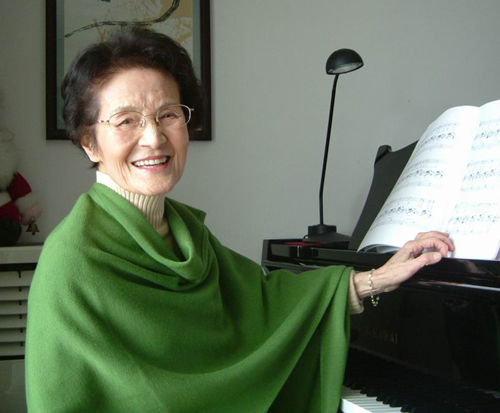A few years ago I sat high up in a rapt, sweltering Albert Hall as a lone pianist performed for two hours in the round. Neither before nor since has the BBC Proms treated a classical musician like a rock god. But then Lang Lang, whether his music-making causes you to cheer or shudder, was and remains the poster boy of a cultural revolution. A few weeks earlier he'd opened the Olympic Games in Beijing.
That afternoon he duetted with two guests: his father on the Chinese erhu, representing China’s musical past, and a nine-year-old pianistic prodigy called Marc Yu representing the slightly alarming shape of things to come. There are now around 100 million Marc Yus in China, Lang Lang estimates. Some of the best of China's new generation of musicians were playing in the first weekend of this year’s Proms as part of the China Philharmonic Orchestra. That performance was screened immediately before this documentary about China’s obsession with classical music.
He found himself relegated from teaching at the conservatoire to cleaning its toilets
Western music, it was explained, was brought to Shanghai by colonisers, and was soon thought by the Chinese authorities to be a positive influence which might discourage Chinese men from spitting, gambling and whoring. A Chinese musician eventually managed to break into Shanghai’s symphony orchestra. But his elevated status changed. By the time the Cultural Revolution came along he found himself relegated from teaching at the conservatoire to cleaning its toilets.
China’s love affair with classical music, which Maoism had deemed imperialist, was accidentally triggered by Mao’s wife. Jiang Qing thought orchestral instruments would encourage a more martial spirit in China’s population than playing gentler indigenous music. When Shanghai opened its first conservatoire there were 18,000 applicants for 200 places.
As the world knows, China doesn’t do anything by halves, but what’s in it for China to have 50 million kids learning to bash out Beethoven on the piano? Is it a social engineering experiment on a vast scale to finetune the brains of the coming generation of conquistadors, or a geo-cultural marketing exercise designed to lull the West? The documentary asked the question, but the answer is of course blowing in the wind. What does seem clear is that China’s relationship to the classical canon is a work in progress.
Tiger mothers and their driven children exemplify a winner-takes-all work ethic that vaunts technical excellence over emotional self-expression. “I support her the whole time,” said a mother who, like many parents, has given up work to ensure that her child practises every waking hour. You’d think that all work and no play makes a dull musical automaton. One Shanghai professor told his young pupil that a passage of music “represents the noblest emotion of humanity”. Such a nuance may not find its way into the fingers of a hothoused young genius. One prodigy called Ying Ting suggested that music “can make me smart, it can make clever, it can make me fearless and it can make me happy”, and it sounded as if he’d learned the words by rote the way he’d learned musical notation.
 The view among China’s senior musical professionals is more hopeful. The conductor Yu Long argued that “music helps kids to raise up their imagination and step in their own world”. And it certainly seems that China - like many diverse cultures - is harnessing the orchestra as a means of teaching children to subsume themselves into a larger organism. It's a handy socialising tool when none of them has siblings. The film dropped in on a community band rehearsal where it was a blessed relief to hear bum notes and see genuine smiles.
The view among China’s senior musical professionals is more hopeful. The conductor Yu Long argued that “music helps kids to raise up their imagination and step in their own world”. And it certainly seems that China - like many diverse cultures - is harnessing the orchestra as a means of teaching children to subsume themselves into a larger organism. It's a handy socialising tool when none of them has siblings. The film dropped in on a community band rehearsal where it was a blessed relief to hear bum notes and see genuine smiles.
The film was framed around a visit to China by Daniel Barenboim’s symbolic West-Eastern Divan Orchestra with its message that music can bring harmony. It might have been more enlightening to hear this from Chinese musicians. At half an hour a documentary called A Hundred Million Musicians felt oddly truncated, as if half the film were missing. The delightful Zhou Xiaoyan (pictured above) deserves a whole profile to herself. In her teens she was a good enough singer to study in the west. In her late 90s she still teaches. For a time she too was silenced in the Maoist crackdown. “They could forbid me to sing and to teach,” she recalled, “but they couldn’t forbid me to think.”















Add comment